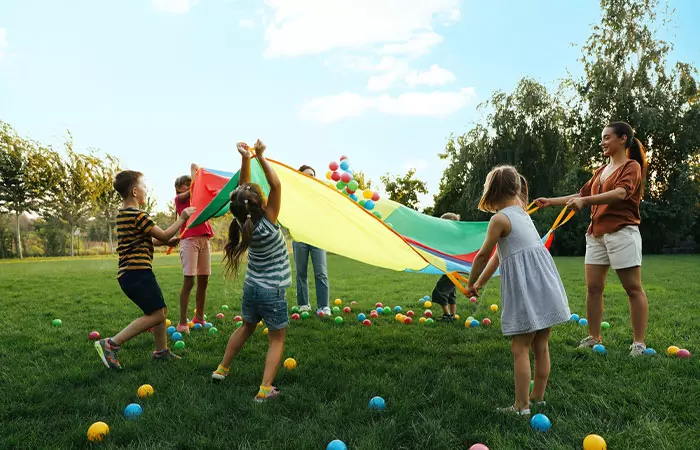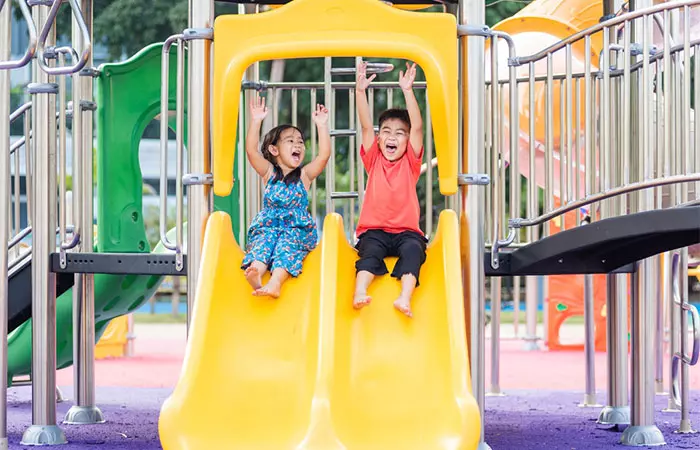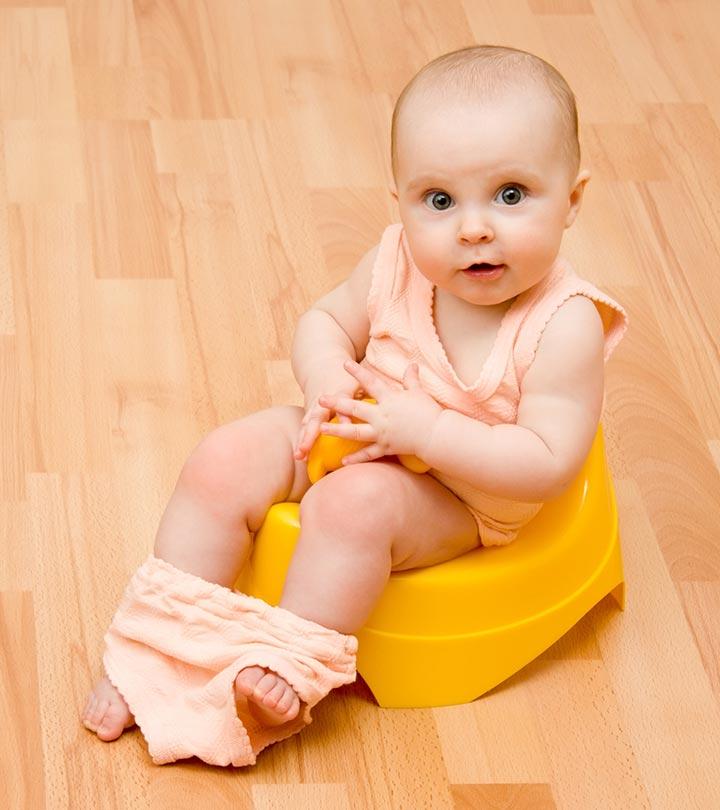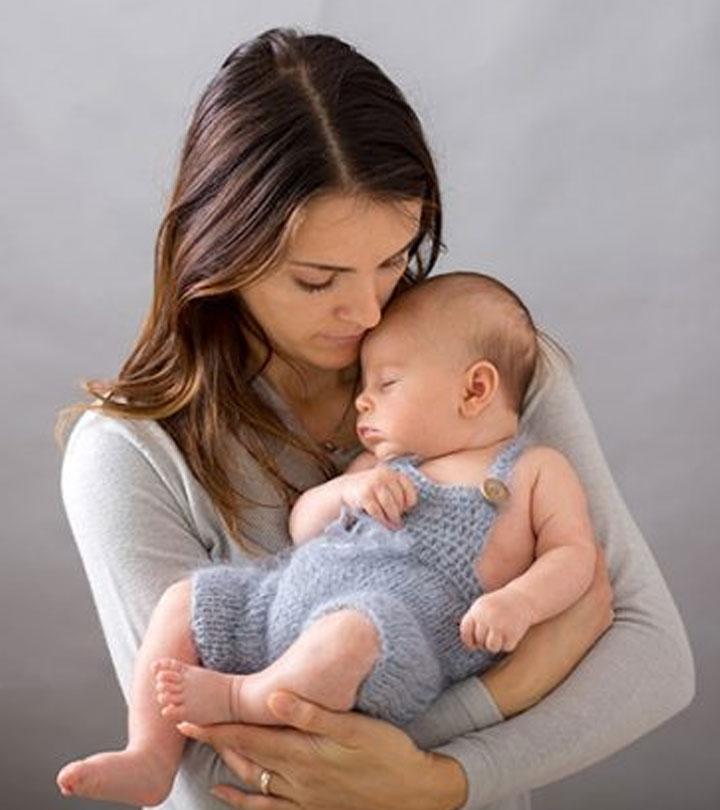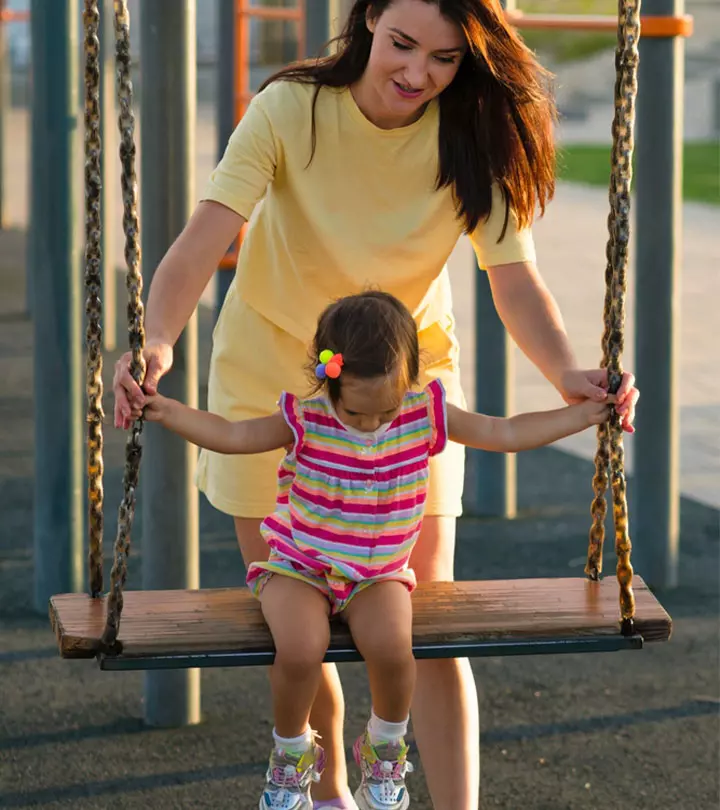
Shutterstock
Playgrounds aren’t just patches of slides and swings; they’re hubs of exploration and joy for kids. These vibrant spaces aren’t just about fun! They are where children learn social skills, resilience, and the art of playing. As a parent, you’re the guiding hand in this whirlwind of excitement and interaction. You hold the key to unlocking the magic of these playgrounds for your child. In this article, we will help you discover how you can turn every trip to the playground into a rich opportunity for growth, fun, and bonding with your little one. Read on to know more!
What If Your Child Is Shy Or Aggressive?
1. Embracing Shyness
Image: Shutterstock
If your child feels hesitant or shy, be their safe harbor. Begin by inviting them to play near other kids without pressure. Offer reassuring words and stay nearby to provide comfort. Celebrate even the smallest steps they take toward interaction. Maybe it starts with a smile or waving to another child. Encourage these efforts with praise and show enthusiasm for their courage. Gradually, as they witness the fun others are having, they’ll feel more comfortable joining in. Remember, it’s about creating a nurturing environment where they feel supported as they gradually explore socializing on their terms.
2. Addressing Aggression
Image: Shutterstock
When your child gets too rough or aggressive, it’s an opportunity for learning. Start by calmly explaining why certain behaviors, like pushing or grabbing, aren’t okay. Help them recognize different emotions by saying things like, “How would you feel if someone did that to you?” Encourage empathy and kindness by highlighting the impact of their actions on others. Engage them in cooperative games or activities that involve teamwork. This helps them understand the importance of playing together and resolving conflicts peacefully.
Role-playing scenarios can also be helpful, letting them practice appropriate behavior in a safe setting. The aim is to guide them towards understanding the value of respectful and considerate interactions with their playmates.
What If Your Child Is Confused Or Is Being Bullied?
1. Dealing With Confusion
Image: Shutterstock
When your child appears confused or overwhelmed at the playground, step in to offer guidance. Engage with them by joining their play, demonstrating how things work, and encouraging their participation. Show enthusiasm and patience as you explain the play equipment or demonstrate games. By actively involving yourself, you help ease their confusion by providing a familiar and supportive presence. Gradually, as they observe and experience the activities, they’ll start feeling more comfortable and confident in navigating the playground’s dynamics.
2. Addressing Bullying
Image: Shutterstock
If your child encounters bullying, reassure them that seeking help is absolutely okay. Encourage them to find a friendly adult, like a parent, teacher, or playground supervisor, and express their concerns. Encourage them to seek safety by playing in a different area if they feel uncomfortable. Talk openly with your child about standing up for themselves assertively while maintaining respect. Empower them with phrases like, “Stop, I don’t like that,” or, “I need help, please.” Additionally, emphasize the importance of supporting others who might be bullied and creating a playground environment where everyone feels safe and included. By fostering open communication and resilience, you equip your child with strategies to address bullying situations effectively while seeking assistance when needed.
Teaching Play With Others
1. Sharing And Taking Turns
Image: Shutterstock
Encourage sharing toys and taking turns during playdates or family activities at home. Make it a playful learning experience by praising moments of sharing and gently guiding them through conflicts that arise. This practice helps your child understand the value of sharing and taking turns, essential skills for harmonious playground interactions. It’s about instilling the idea that everyone gets a chance and that sharing can make playtime more enjoyable for everyone.
2. Making Friends
Image: Shutterstock
Guide your child in approaching others with kindness and openness. Encourage them to use friendly gestures like a smile or wave to initiate contact. Practice simple conversation starters such as “Hi, can I join you?” or “What are you playing?” through role-playing at home. These interactions build confidence and teach the importance of initiating friendships with warmth and curiosity, laying the foundation for positive social connections.
3. Resolving Conflicts
Image: Shutterstock
Teach your child simple conflict resolution techniques they can use at the playground. Encourage them to listen to others’ perspectives and express their own feelings calmly. Show them how compromise and finding solutions together can resolve disputes, such as taking turns on the swing or sharing play equipment. By demonstrating these problem-solving skills, you empower your child to navigate playground conflicts peacefully, fostering an environment of understanding and cooperation among peers.
The playground is more than just a place for fun; it’s a space for learning valuable social skills. Encourage your kids to embrace their uniqueness and show kindness to others. By instilling these values, you’re not just making playground time enjoyable but also fostering qualities that last a lifetime.





